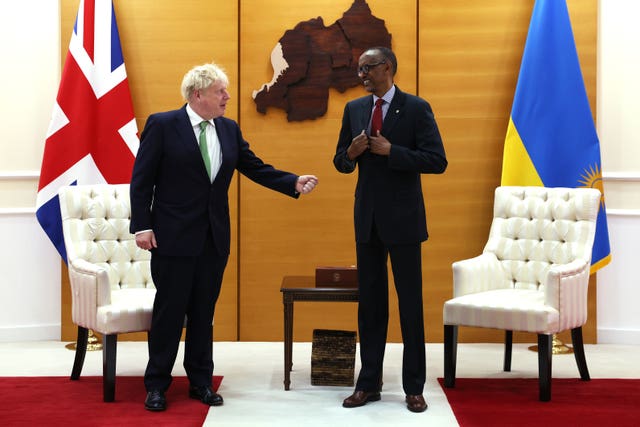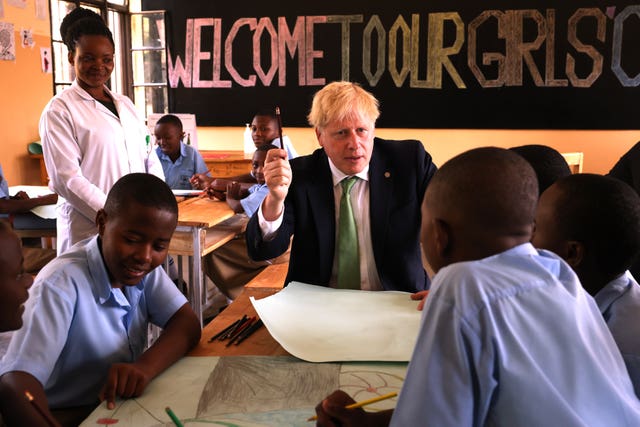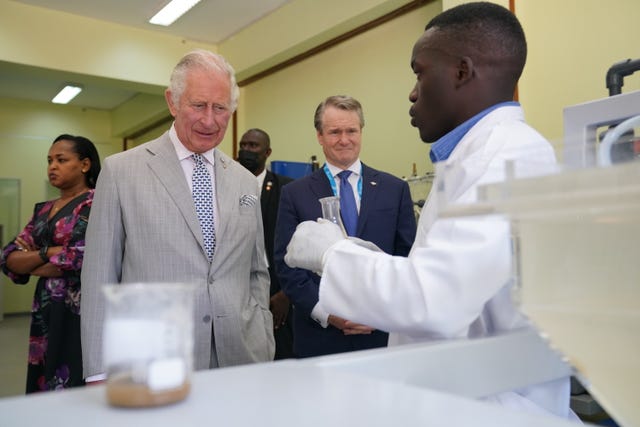Boris Johnson said he was prepared to stress the “obvious merits” of his Rwanda asylum policy to the Prince of Wales when they hold talks in Kigali following Charles’s reported criticism.
The Prime Minister struck out at “condescending” opponents of plans to forcibly remove migrants to the East African nation, a policy the prince is said to have called “appalling”.
But Downing Street tried to dampen down expectations the pair would discuss the scheme, which has been grounded by legal challenges, after conversations between No 10 and Clarence House on Thursday.
They will meet for talks over cups of tea at the centre for the Commonwealth Heads of Government Meeting (Chogm) leaders summit they are attending in the Rwandan capital.

It will follow Mr Johnson holding talks with Rwandan president Paul Kagame, during which he failed to bring up the significant human rights concerns about his regime.
The government in Kigali said they had already received payments under the £120 million economic and migration deal signed two months ago, and have already spent some of the money.
The Prime Minister and Charles’s conversation will be their first since it was reported the prince described the policy as “appalling” in private remarks.
Good to meet President @PaulKagame in the beautiful city of Kigali this morning.
As we hand over the Commonwealth Chair-in-Office to Rwanda, our countries will be working together closely to address the most pressing global challenges.
🇬🇧🇷🇼 pic.twitter.com/Qd2LmMXNzU
— Boris Johnson (@BorisJohnson) June 23, 2022
Mr Johnson said he is “delighted that Prince Charles and everybody is here today to see a country that has undergone a complete, or a very substantial transformation”.
During an interview with broadcasters at a school in Kigali, the Prime Minister was asked if he is willing to defend the policy if Charles raises it.
“People need to keep an open mind about the policy, the critics need to keep an open mind about the policy. A lot of people can see its obvious merits. So yeah, of course, if I am seeing the prince tomorrow, I am going to be making that point,” Mr Johnson said.

Speaking to reporters as he prepared to fly to Rwanda, Mr Johnson had said he hopes the trip would “perhaps help others to shed some of their condescending attitudes to Rwanda and how that partnership might work”.
But the Prime Minister’s official spokesman went on to say it was “unlikely” Mr Johnson would bring up the policy, which he argued was not “at the forefront of his mind”.
It was understood that Charles was unlikely to bring it up either.
Mr Kagame has been lauded for his role in ending the 1994 genocide that saw ethnic Hutu extremists slaughter about 800,000 Tutsis and moderate Hutus during 100 days of the civil war.
But his regime has since been accused of political repression, alleged assassinations and the imprisonment of critics.
Downing Street had suggested Mr Johnson, who visited Kigali’s genocide memorial on Thursday, would raise human rights concerns.
But after their meeting, his spokesman said: “I don’t believe they discussed that in their meeting, there were quite a number of issues they talked through.
“You’ll know that some of the concerns with regards to rights have been raised on a number of occasions including at ministerial level very recently, so it is something we do raise with Rwanda.”
Despite it being Mr Johnson’s first visit to the nation during his time in No 10, he was not planning to visit any of the accommodation earmarked for the scheme.

The first flight removing people to Rwanda was due to take off last week, but was grounded by successful legal challenges ahead of a full hearing on the scheme’s legality in UK courts.
Despite the policy effectively being grounded until a ruling on its legality in UK courts, the pair claimed it is already working.
A No 10 spokesman said: “The leaders also praised the successful UK-Rwanda Migration and Economic Development Partnership, which is tackling dangerous smuggling gangs while offering people a chance to build a new life in a safe country.”
On Thursday night, Mr Johnson was to attend a leaders’ dinner hosted by Mr Kagame.
The following day he will attend the Chogm opening ceremony, take part in summit sessions and dine at the banquet hosted by Charles.




Comments: Our rules
We want our comments to be a lively and valuable part of our community - a place where readers can debate and engage with the most important local issues. The ability to comment on our stories is a privilege, not a right, however, and that privilege may be withdrawn if it is abused or misused.
Please report any comments that break our rules.
Read the rules here